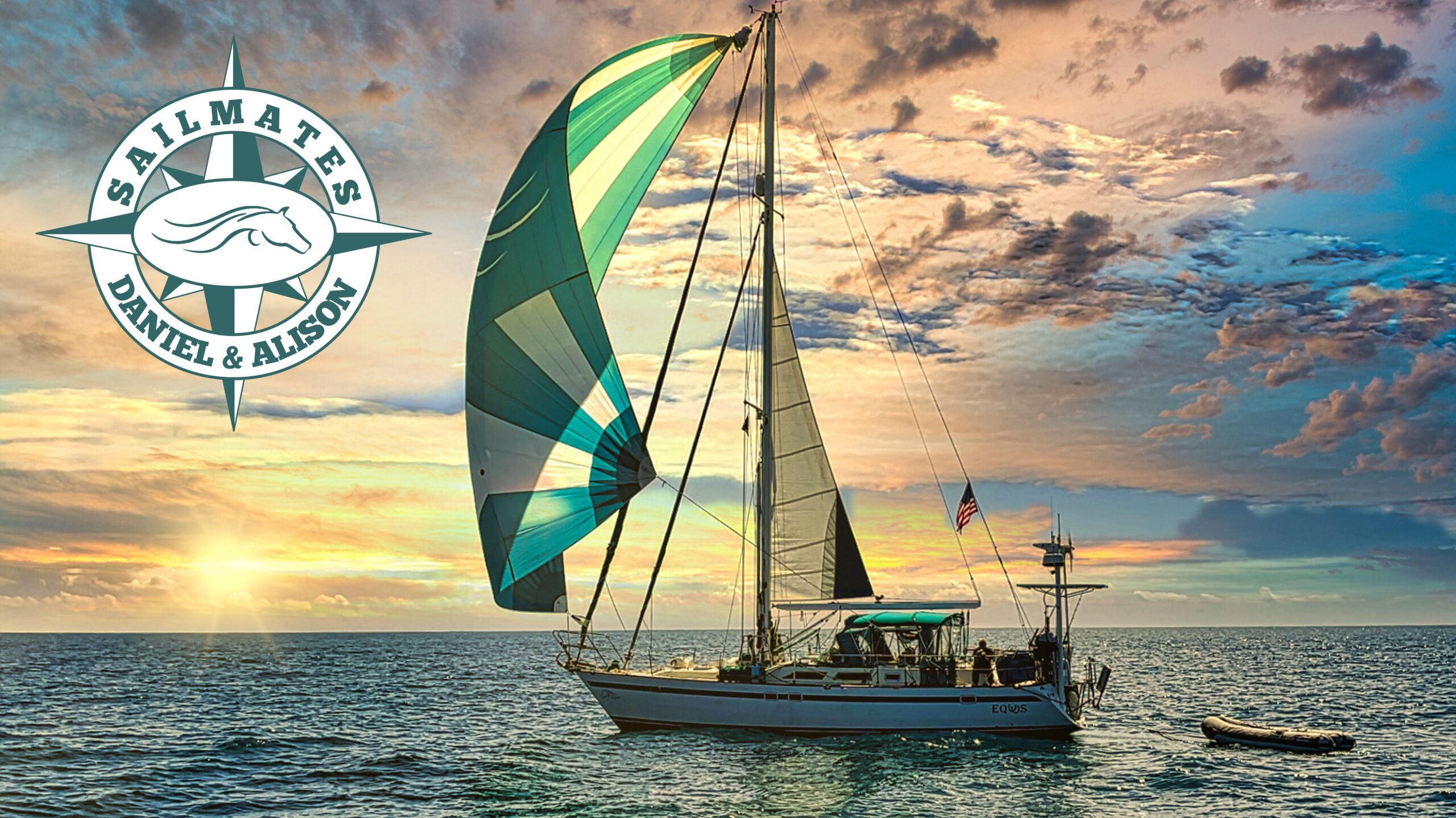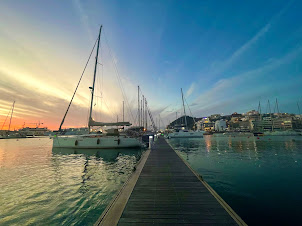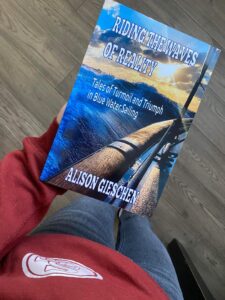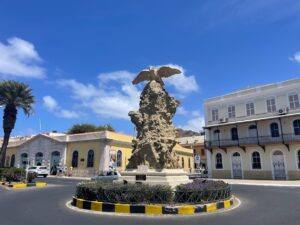
The entire sky and horizon were shrouded in an impenetrable haze. Saraha winds were blowing across the sea from Africa. The sun couldn’t penetrate through the veil and appeared as a dim orb, and there was no color on the horizon as the sun rose and set.
We felt confident about making the hop directly to Barbados. However, fate had other plans as we encountered issues with our autopilot five days into the passage. Our problems began when our autopilot protested and began shutting off repeatedly.
We had a decision to make. Should we cross the Atlantic with a ‘maybe pilot’ or divert to Cape Verde and sort out our problems? Since our route was taking us less than 100 miles from the island anyway, we altered our course to Mindelo, nestled on the island of São Vicente in Cape Verde. We intended to get the autopilot checked out and be off in a few days. I’m writing this post one month later, from the harbor of Mindelo. We have now been delayed two months waiting for parts.
Living in Cape Verde
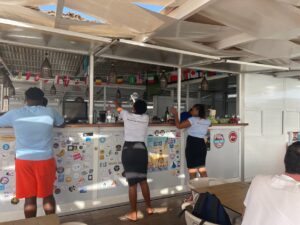
I would like you to take a minute and guess how much these repair people make… I’ll wait.
The average salary in Cape Verde is 3,800 dollars a year. Monthly, that’s around $320 a month. Can you imagine living on $300 a month? Many of the people here work six days a week.
A one-room apartment costs $300 to $600 a month. Are you wondering like I do; how do these people have any money left to eat? Two-bedroom and larger apartments go for much more. I know from stories from a new friend we met here, that these apartments have the bare minimum. We are talking about limited electricity and no running water. Our friend’s girlfriend has a barrel of water in her kitchen. She has to fill it herself. This water is used for drinking, cooking, and bathing. When she wants to take a bath, she has to sit in a small tub and pour water over herself.
Water, on an arid island that gets from four to eight inches of rain a year, is a premium commodity. In the US, we can get four inches in an hour. Staying here on our boat, we have to pay for every drop of water we use. Normally, when you pay to stay in a marina, you can use their shower facilities. We were issued a water card when we arrived. You pre-pay on the card for the number of liters of water you think you will be using. To take a shower, you have to put your card in a slot before the shower will turn on. You pay for the amount you use, and, it is cold water only.
To use the water at the dock, you place the card in a meter, then the water will turn on. When you’ve used up how much water you have prepaid for, the tap shuts off. Luxuries like washing our boat, and using water freely are not an option here. As the atmosphere is filled with red dust blowing in from the Sahara, our boat remains horribly dirty.

The stores are tiny and there is an extremely limited supply of fresh vegetables and fruit. There is no commercial bread, the kind you would pick off the shelf to make a sandwich; sliced bread. You have to arrive early to grab some of the fresh rolls they have in the grocery store. They are not on par with bread from other countries we have visited and I suspect have fillers like corn starch as the texture is very soft and strange. Thankfully, due to the lack of good bread, I have been perfecting my art of bread-making. See? There is usually a silver lining to our experiences.
Autopilot Blues
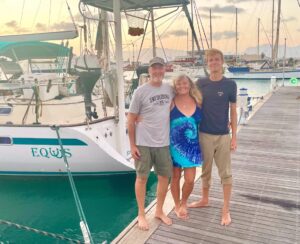
I’m going to spare you most of the details of what ensued. Here is the synopsis. Boat CV said that any motor repairs would take weeks, which is months in Cape Verde time. They had one autopilot in stock. It was the wrong size for our boat (too small a motor) but they could possibly switch the motor with the larger version. Bouyed with optimism, Dan pondered and calculated how to make it fit in the space where our other autopilot is placed. It wouldn’t work. There just wasn’t room without cutting substantial portions of our hull. He wasn’t comfortable doing that.
That left us with one option. We could attempt to cross and pray our autopilot, at worst, would shut off now and then. No big deal, we would have to be vigilant, but it wasn’t the worst-case scenario. Our young hitchhiker friend Tom, whom we met in Las Palmas had gotten a ride to Mindelo and was here, still looking for a boat to cross to the Caribbean. We figured we would take Tom on as crew in case something went wrong with the autopilot, and get our repairs in the Caribbean.
We waited a full week at anchor for a good weather window. The perfect weather filled in. We were all excited to be crossing. The sun was shining, we were fully provisioned, there was a nice breeze for our downwind departure, and life seemed good again. Our joy lasted about an hour.
Catabatic winds funnel between the island turning the water into something akin to a washing machine. Our start was a bit rough. We had a couple of hours to sail before we would be out of the wind sheer and get to calmer waters. During the first hour, we were very pleased. The autopilot didn’t kick off once. Dan stood behind the helm, a smile on his face, until, the silence was broken by the autopilot alarm.
No one said a word. Dan re-engaged it and we all held our breath. Moments later, the alarm went off again. Dan said a few curse words, the same ones I was thinking. Then, the autopilot completely failed.
I was against hand steering for two weeks. I think everyone else felt the same. Heartsick, we turned the boat around and headed back the way we had come. Unfortunately, we were now going upwind and into the harsh waves. Our sea pony bucked and tossed in protest. It was not a pleasant ride back to the harbor, which took us two hours as we were going against the wind and current.
GOOD NEWS! Not…
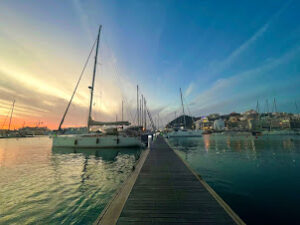
“Way ahead of you,” Dan replied.
Once again, to tell the story of what ensued would take a long time to describe. Here is a simple breakdown.
- We anchored the first night. Dan had an epiphany. He laid awake thinking and came up with a solution to fit the new electric autopilot on our boat by putting it on the other side of the rudder. It would still take some modifications, but the port side had a void space under the floor of the storage compartment. He was sure it was doable.
- The next morning, we got a slip in the marina. Gilson, our BoatCV tech, arrived at our boat and said he had some bad news. The autopilot they had available had been bought and paid for the prior day. We would have to order a new one.
- The next day, Gilson said he had some good news. He asked the skipper, who was traveling to Portugal for ten days, if we could have the autopilot and they would order the new one for him which would also take ten days. The skipper agreed.
- Work began on the boat. Fiberglass and wooden supports had to be cut and modified. We had to have a metal bracket made, and the space had to be re-fiber glassed. The work took a week.
- Tom found another boat and left. Who could blame him?
- Gilson had some more bad news. The boat owner of the new autopilot didn’t like the decision the skipper had made and wanted his autopilot back.
- We played the boat part waiting game. Two weeks later, the new autopilot arrived on the island. We celebrated.
- What we didn’t know was that the part was on the island, but it was in customs. We were told they may hold it for three days. They held it for a week. Apparently, bribes do work but we didn’t know the right people.
- The good news is the autopilot was handed off the Boat CV by customs. The bad news is the company sent the wrong unit. They sent a 24 volt and we needed a 12 volt. The company said they would air-express the right unit and it would be there in three days.
- A week later, there is still no word about the arrival of the new autopilot. DHL, the worst excuse for a shipping company on the planet, had no tracking information for the unit. They have no idea where it is.
That’s the breakdown of what has transpired. As I write this post, we were waiting for our repair person to arrive with the first autopilot, the wrong voltage unit.
“How are you installing the wrong voltage unit,” you might be asking.
Boat CV has a 12-volt motor that they are going to swap out for the 24-volt. Dan was very suspicious that swapping out the motor will have some kind of negative consequence. Turns out he was right.
We just got the message that Boat CV was not able to make the switch. Just like Shoots and Ladders, we were on the last square to winning, and we just slid all the way back to the beginning of the game. Maybe God is intervening here. Perhaps we would have gotten to the middle of the ocean and the autopilot would have had problems and shut down again. We don’t even have a third person to help us hand steer. Dan’s gut feelings are usually right. A jury-rigged autopilot was not meant to go on our boat and cause us future problems, especially for the money we are paying for it.
What Lies Ahead
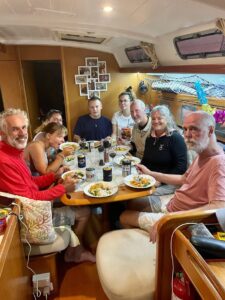
For instance, “Thinking of Dave” was a boat we met in Las Palmas. Like us, they too were waiting there for boat parts that took forever to arrive. Their wait was also over a month. They also tried crossing to the Caribbean from the Canaries and found themselves in Mindelo. Their story was way worse than ours.
Two days into their trip, they lost all power to their boat. A storm was following so they didn’t have the option of turning back and sailing to Las Palmas. They would have to sail upwind in giant waves with no engine. They did have five crew members as they picked up three hitchhikers in Las Palmas. The 20-year-olds had no ocean experience and were now forced to hand steer in 10-foot waves and 30-plus knots of wind.
The boat took a beating, sails ripped, their steering shaft loosened and now had “play” (a wobble) in it. The nail in their coffin was when they finally arrived at 2 AM at the harbor. They had contacted the marine police by satellite phone that morning and asked if they could be towed to the dock at 2 AM as they didn’t have an engine. The police confirmed there would be no problem with a 2 AM arrival.
As soon as they entered the harbor under sail, they called for the marine police. No one answered. They couldn’t drop anchor as it required electricity so they had to tack back and forth in the dark, praying they didn’t hit anything or anybody in the dark. There is a sunken boat in the middle of the harbor, and boats anchored everywhere. As they had never been to this harbor, and it was pitch black, it was terrifying.
For two hours, they had to tack back and forth across the narrow harbor. They yelled screamed, flashed lights, and repeatedly called for help. No one answered. Finally, in an act of desperation, they called the Cape Verde land emergency number, 112. Thank God, someone answered.
The land police drove to the marine police and woke up the guy supposedly monitoring the radio. It was another half-hour before the marine police arrived. They spoke no English. They yelled for “Thinking of Dave” to follow them to the fuel dock, which they discovered through the help of Google Translate.
Of course, they couldn’t start their engine and the fuel dock was upwind, which made that request impossible, never mind the fact they had pre-arranged a tow. The marine police left to get a tow boat. After they were finally towed, it was not to the marina fuel dock as had been prearranged. The tow boat took them to the ferry dock. That was a huge mistake. They didn’t get docked until 4 AM. At 6 AM, they were rudely awakened and told by the ferry people that they had to vacate the dock immediately as a ferry was about to enter.
The entire ordeal was a nightmare. When telling the story, they can now reflect and admit that had they not been so exhausted and at their wit’s end, they would have laughed their way through the ordeal. It was a sad comedy of errors.
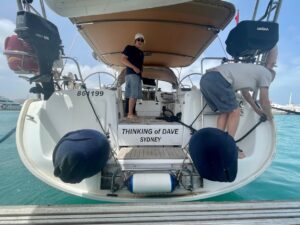
Fortunately, Marc got all his repairs done and was able to depart yesterday. We helped cast off his dock lines. I teared up and had a good cry as I watched his boat sail off into the sea. I felt bad for all he had been through, for all his troubles at the end of his voyage. He told us so many amazing stories of the places he had been and the wonderful moments he had experienced. My heart broke at the sadness in his eyes that his adventures were almost over and he would be returning to land life. I had a moment of self-pity as well. I’m far from stoic. I wondered when it would be our turn to cast off.
Most of all, I prayed his last crossing would be beautiful, magical, and the ending to his trip that he had been hoping for; and that all the recent trouble and chaos would fade like a puff of smoke in a breezy, sun-filled day.
Marc’s experiences made ours seem trivial. The worst thing we’ve had to do is pay money and wait. It breaks my heart every time we go to the grocery store as hungry faces are beckoning us outside the door, pointing to their mouths and begging us to bring them food. Children, and skinny old men, are starving here. We, on the other hand, may have to wait, but we have food in our bellies, and hopefully, we have a future ahead of us filled with incredible adventures. Sometimes, I have my doubts.
Fair winds,
Alison and Dan
S/V/ Equus
(NOW AVAILABLE IN AUDIOBOOK)
Enjoying our blog posts? Check out our newly launched book, Riding the Waves of Reality. This is the story of the first five years of our circumnavigation. There are lots of practical tips as well as the facts and realities of liveaboard sailing. This book is for anyone who loves adventure, travel, the discovery of new places, and tales of overcoming adversity. Put it on your gift lifts for your sailing and adventure-loving friends!
5 Star Reviews!
“A well written account about the perils and joys of challenging the powers of the oceans and surviving.This book is as interesting to the non sailors as to those who aspire to commit to a life changing experience. For the wannabe sailors it provides them with the dangers as well as the joy, beauty and excitement of blue water sailing. For fellow sailors it introduces them to many remote ports of interest and obstacals to be dealt with especially regulatory issues . For the average reader it is a rewarding read, providing excitement, interesting stories of adventure, perils, beauty and success to achieve freedom of being one with the ocean.”

